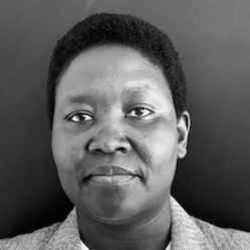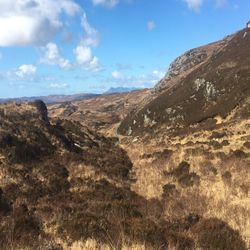Share

Tourism Geographies Podcast
On the gender imperative in tourism geographies research
Season 2, Ep. 33
•
Doi: 10.1080/14616688.2023.2290002Abstract
This discussion provides a critical review of gender issues in tourism geographies. It maps historical and contemporary developments and provides a future research agenda that suggests moving beyond binary and Western gender discourses.
More episodes
View all episodes

16. Popular culture and tourism: conceptual advances and future directions
26:33||Season 3, Ep. 16https://www.tandfonline.com/doi/full/10.1080/14616688.2024.2412552AbstractThis review of the intersection between popular culture and tourism surveys progress in the field and suggests directions for future research. Popular culture as fuel for niche tourism, interpreted in relation to nostalgia, authenticity, and identity, has been supplemented by research on embodiment and performativity, and the influence of social media. Popular culture remains a strong rationale for travel and is thoroughly imbricated in tourism’s corporatised and platformised industry superstructure. Yet, as subcultures and social media proliferate globally and are refracted by cultural diversity and a more disruptive world, research will need to adapt accordingly, linking structural analysis of industry consolidation, cyclicality, and fluidity, with critical cultural theories in order to pluralise, diversify and contest understandings of popular culture and its connection to tourism.
15. A critical reflection on tourism geopolitics: research progress and future agenda
17:02||Season 3, Ep. 15https://www.tandfonline.com/doi/full/10.1080/14616688.2024.2366481AbstractTourism and geopolitics are intrinsically linked. However, current studies on the geopolitical facets of tourism are insufficient. This article first reflects on the diversified understandings of geopolitics and how these different interpretations are reproduced in existing tourism geopolitics scholarship. We then elucidate the multiple complicated and intimate entanglements between tourism and geopolitics and highlight the often underestimated geopolitical agency of tourism. Following this, we evaluate the state of the extant research on this topic. Finally, we suggest three directions for future research: (1) deepening theorisation and operationalisation, (2) attending to agency, mechanism, and non-state actors, and (3) adopting a spatially sensitive perspective. In summary, we argue that further conjoining the relatively isolated tourism and geopolitics terrain benefits both disciplines of tourism geography and political geography, and calls for the development of innovative interdisciplinary, theoretical, and methodological approaches to advance the field.
14. Pragmatic arguments for decolonising tourism praxis in Africa
40:35||Season 3, Ep. 14https://www.tandfonline.com/doi/full/10.1080/14616688.2024.2335955AbstractThis conceptual essay extends decolonisation debates to the broader context of decoloniality of praxis. It acknowledges the significance of epistemological and pedagogical decolonisation but argues that these do not fully engage with the entrenched coloniality in tourism in Africa. The essay problematises the conventional explanations for Africa’s underperformance in international tourism and its erasure of Africans as tourists. It proffers pragmatic arguments for decolonising tourism in Africa, given the unprecedented decline in international tourism during the Covid-19 pandemic, the historically contradictory images of Africa, the latent demand for domestic and regional tourism, the youthful population of Africa, and the possibility of Africa-wide freedom of movement emanating from implementation of the African Continental Free Trade Area. The article emphasizes the need for concomitant representivity of Africans as producers and consumers of tourism experiences from within the continent, partly facilitated through principles of subsidiarity, although potential resistance to such a pursuit is acknowledged.
13. Tourism as an everyday geopolitical project
17:22||Season 3, Ep. 13https://www.tandfonline.com/doi/full/10.1080/14616688.2024.2387212AbstractThis article examines tourism as an everyday geopolitical project. Following feminist, queer, Black, Caribbean and Latin American contributions to the critical analysis of tourism geographies, it turns the attention to tourism’s capacity to produce and reinforce uneven geographies, recreate colonial relations, and catalyze racialized and gendered dispossession. In doing so, it insists on the violent geographies of tourism and their sedimentations in everyday life.
12. Significance of biocultural heritage, cultural landscape and islandness for responsible tourism: a Knoydart case study
23:10||Season 3, Ep. 12https://www.tandfonline.com/doi/full/10.1080/14616688.2024.2325943AbstractThe COVID-19 pandemic, environmental crisis and increasing growth in tourism prompted interest in more responsible tourism. So called responsible tourism (RT) entails diverse ingredients and an aim of this research is to understand if residents of community owned nature-rich land believe they have responsibility to share with visitors, or if their focus is shifting toward prioritising environmental conservation and or personal wellbeing. In this case study a unique perception of RT emerges in Knoydart Scotland, born from a pronounced awareness of biocultural heritage and a self-directed understanding of landscape as cultural. A distinctive feature in this case study is an expression of abundant generosity evolving from participants’ embodied understanding of the integration of culture and nature. This commitment to a cultural landscape is particularly noteworthy since it is set within a location presented to tourists as ‘wilderness’. Findings suggest that it is meaningful to explore historically evolved cultural understandings of ‘islandness’ and biocultural heritage, before promoting exogenous RT strategies. This research revitalizes frequently discredited notions about what responsible and sustainable tourism involve, as well as offering a rare example of the impacts of ‘islandness’ within a mainland setting.
11. The spectral geographies of slavery: tourism and the hauntings of dissonant colonial heritage
21:18||Season 3, Ep. 11https://www.tandfonline.com/doi/full/10.1080/14616688.2024.2328612AbstractThe spectral geography of the colonial legacy in Bristol is marked by a series of absences from official and tourist narratives about the city. The people and practices of the Atlantic slave trade are part of the historical and contemporary fabric of the city and persist as ever-present spectres. There are significant differences of view that agree with little beyond that the city was a major port of Empire and a significant site in the triangular trade. Bristol is commonly portrayed as a multicultural city with a rebellious spirit and a strong commitment to social justice. This urban imaginary is evident in accounts of the removal of a statue of Edward Colston, a slave trader and philanthropist, during a Black Lives Matter rally in 2020. The now empty plinth of the Colston statue has become a contested, liminal space that sits between disparate interpretations and radically different points in time in terms of social relations. Individual and collective memories and stories about slavery constitute hauntings in a spectral geography of Bristol. Such stories are rarely heard, and the city is thus haunted by the absences of the voices of those enslaved and a lack of knowledge of the role of slavery in the growth and historic prosperity of the city. Little has been done to incorporate such dissonant heritage and so the histories of slavers, slavery, and slaves are not significant themes in tourism marketing, attractions or experiences in the city. This paper demonstrates that a process of coming to terms with difficult heritage and associated hauntings offers significant potential for tourism to contribute to historic and contemporary social justice.
10. Precarious labour geographies of working holiday makers: querying sustainability
31:07||Season 3, Ep. 10https://doi.org/10.1080/14616688.2024.2366488AbstractThe boundaries between tourism and migration are blurry. This blurring has been beneficial for the governments of wealthy countries enabling them to import a large and flexible temporary workforce that can be directed toward regions and industries where there are labour shortages. Such is the case with the Australian Working Holiday Program (AWHP); a historically tourism-focused cultural exchange program that began in 1975. Since the 1990s, the Australian Government has leveraged the AWHP to support several of Australia’s critical industries. This has been achieved through the tweaking of mobility infrastructures that link Working Holiday Makers’ (WHMs) ability to stay in Australia to employment conditions. Such conditions increase precarity among WHMs, directing them towards remote regions and industries where there are evident labour shortages. While these mobility infrastructures significantly benefit Australia’s economy, they result in WHMs being highly vulnerable to exploitation. Such vulnerability is layered with WHMs from less wealthy, non-English-speaking countries facing the highest levels of vulnerability. This study investigates the way mobility infrastructures in the AWHP influence WHMs’ mobilities, as well as how such mobilities are experienced in uneven and unjust ways. There is urgency to interrogate the role that such programs play in contributing to unjust mobilities, and to query the attendant implications for sustainability.
9. Seeing like a settler: place-making, settler heritage, and tourism in Dubbo, Australia
18:52||Season 3, Ep. 9https://doi.org/10.1080/14616688.2024.2380321AbstractThis paper focuses on the settler colonial landscapes of tourism in the regional city of Dubbo, Australia. Dubbo is situated on Wiradyuri Country in the Orana region of New South Wales. Focusing specifically on the heritage-listed Old Dubbo Gaol and the Dundullimal Homestead, a former pastoral station, I explicate how these tourist sites offer experiences that normalise settler dwelling and occupation of First Nations Country. The Old Dubbo Gaol and Dundullimal occupy a broader settler colonial landscape where Dubbo is presented historically as ‘empty’ until settlers exploited the town’s ‘natural’ resources. By occluding the relationship between invasion, pastoralism, and Indigenous dispossession, the sites reproduce for visitors settler colonial metanarratives of dwelling. Using Tim Ingold’s notion of taskscape, I show how the tourist sites create taskscapes which invite visitors and consumers to engage in settler forms of dwelling that normalise a settler colonial landscape. Tourist taskscapes consist of the activities and interactions in a heritage site that encourage visitors to take an active role in experiencing place and history. By aligning these experiences and activities to settler narratives and histories, the sites interpellate visitors into the processes of autochthony that were/are used to negate First Nations sovereignties. While these taskscapes are leaky and contain the presence of First Nations in select parts of the heritage sites, the taskscapes dominate heritage tourism and normalise settler colonisation as a feature of place-making that does not require explicit explanation or education.
8. Social media and tourism geographies: mapping future research agenda
21:04||Season 3, Ep. 8https://doi.org/10.1080/14616688.2024.2304782AbstractThe fast-changing social media landscape have seen a paradigm shift in how we interact with and research space, place and environment in tourism. Social media presents both challenges and opportunities for tourism geographies due to the vast amount of and various data types. This research provides a concise state of the art and critical review of the history of social media research in tourism geographies by identifying the current status quo and research gaps. Accordingly, I highlight several directions for future tourism geographies research including cross-modalities of social media content, semantics and sense of place, technology and artificial intelligence in social media, social media communication, theoretical engagement, ethics and methodological considerations. This review calls for future research to develop innovative interdisciplinary, theoretical, and methodological approaches to advance theories and practices in social media and in relation to tourism geographies.